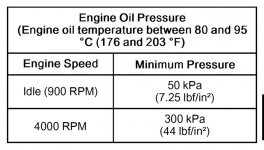And there's also the fact that needlessly running a heavier oil (like an SAE 50) more suited to much higher engine oil temps in an hi-tech, close tolerance, engine that's been optimised to use a certain weight range of oil AND THEN RARELY USES ANY OIL BETWEEN SERVICES (like the ROTAX 1330 ACE motors) can really mess with things like fuel economy (heavier oil, more internal drag, more gas consumed); engine longevity (greater wear on components that have tolerances that require finer oil than the long chain 'won't break down at high temp' molecules); and even outright performance (see fuel economy comments and Ron's comments on the changes in pressure/resistance etc. especially at start up, as that can work BOTH ways - if the oil is too heavy for the pump to pick up = low pressure; if it'll pick it up & move it, but it's bloody hard to move/push thru some spots = high pressure!); but also add to that the fact that without the higher engine/oil temps they're designed for, the heavier oil adds drag to the movement of
every moving part inside the engine ALL THE TIME, too!! :banghead:
Don't laugh, if you want to confirm any/all of this for yourself, there's a lot of evidentiary data out there about it, just not readily accessible via a superficial glance and/or not looking beyond the usual (quite shallow) depths provided by social media sites & influencers, u-tube 'oil guru's' etc; but I've personally seen this occur on engine test beds; I've personally seen and experienced it on the track - running an oil that's too heavy for your engine & its operating temp, ie. an oil that has a higher SAE rating than your engine was ever intended to use,
CAN be detrimental in a lot of ways, almost always
costing you more in the short term for little, if any, gain; and usually contributing significantly to wearing your engine out quicker, if not actually destroying it, in the longer term. nojoke
But it is your Spyder and your choice - just not something that
I'd ever do in the engine of a vehicle I wanted to keep
and keep performing well; not even when riding here with Oz's high temps on my 998 V-twin Rotax Spyder, which has an engine that
DOES use oil between scheduled changes and so has a far greater tolerance for heavier oils than any of the ROTAX ACE engines!

Good Luck! :cheers:


